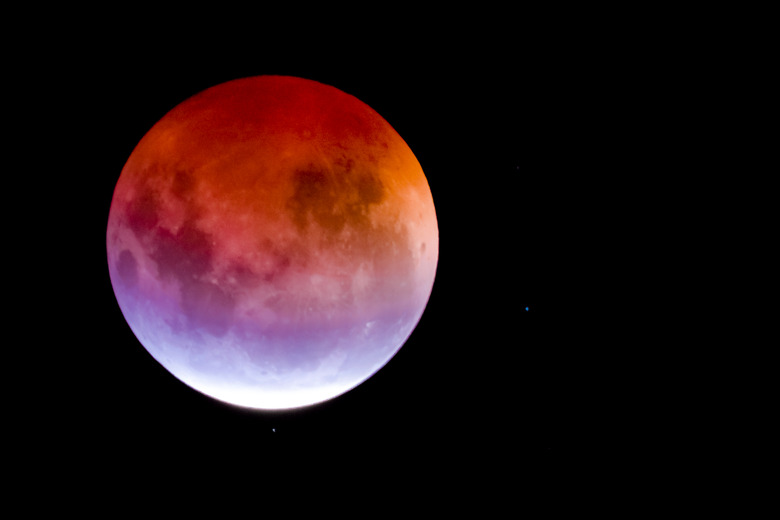The Effects Of Lunar Eclipses
NASA says there is no evidence that supports the idea that lunar eclipses have a physical effect on people. But it does admit that eclipses can produce "profound psychological effects" that can lead to physical effects because of the beliefs people have and the actions they take because of those beliefs. Lunar eclipses occur when the full moon passes into the shadow of the side of the Earth facing away from the sun. Eclipses temporarily dim the light of the full moon.
TL;DR (Too Long; Didn't Read)
A lunar eclipse's blood-red color comes from sunlight bent through the Earth's atmosphere and reaching the moon before being reflected to Earth. Visual results may vary depending on the clarity of the sky and amount of light around the observation point.
Moon Shadows
Moon Shadows
The moon first enters the outer partial shadow called the penumbra. The moon's brightness gradually fades and appears to have a dimmer portion, which moves from left to right across the moon face as it travels deeper into the penumbra. When the moon moves into the umbra – the darkest portion of the Earth's shadow – it begins to appear as though a bite has been taken out of the moon. This bite grows until the moon is completely within the total eclipse phase. It becomes fully visible as a copper orange-red color once it's all the way inside the umbra shadow.
Eclipse Duration and Tidal Effects
Eclipse Duration and Tidal Effects
The process reverses as the moon leaves the shadow. A lunar eclipse lasts a total of about three hours from start to finish. The period of totality – when the moon is in the umbra – usually lasts about an hour, with some variation for each eclipse. The pull of the sun and moon add to the tidal effects anytime they're in line with the Earth. This pull subtracts from the tidal pull when the sun and moon are at right angles to each other from Earth. Because a lunar eclipse only takes place during a full moon, tides are higher during this time.
Wildlife and Eclipses
Wildlife and Eclipses
Centuries-old lore claims that wildlife behave differently during a lunar eclipse. A study of the owl monkey conducted in 2010 by the University of Pennsylvania Department of Anthropology showed a pronounced change in monkey activity during a lunar eclipse. The study suggests this is due to the changing light levels as the eclipse proceeds.
People and Eclipses
People and Eclipses
While science finds no physical links to lunar eclipses, the beliefs about eclipses – and their causes –have led to some profound changes to humans throughout history. Eclipses, often viewed as signs or evil omens have led ancient tribes to sacrifice animals and other humans to sway what is seen as the angry mood of the gods.
Cite This Article
MLA
LaNore, Steve. "The Effects Of Lunar Eclipses" sciencing.com, https://www.sciencing.com/effects-lunar-eclipses-8527192/. 20 July 2018.
APA
LaNore, Steve. (2018, July 20). The Effects Of Lunar Eclipses. sciencing.com. Retrieved from https://www.sciencing.com/effects-lunar-eclipses-8527192/
Chicago
LaNore, Steve. The Effects Of Lunar Eclipses last modified March 24, 2022. https://www.sciencing.com/effects-lunar-eclipses-8527192/
